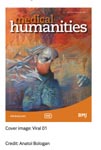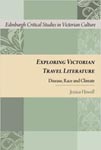Biography
Professor Howell’s research engages health, race, and gender in nineteenth-century literatures of empire, as well as post- / de-colonial Health Humanities. Her monographs are Exploring Victorian Travel Literature: Disease, Race and Climate (Edinburgh University Press, 2014) and Malaria and Victorian Fictions of Empire (Cambridge University Press, 2018). The research for her current book project, titled “The Healthy Victorian Woman,” is supported by an Arts & Humanities Fellowship (2021-2024). She recently completed, with collaborators in History and Economics, the “Global Health and the Humanities” T3 grant and oral history project. Dr. Howell teaches courses in Victorian literature, literature and medicine, the Health Humanities, and women’s travel writing. She also has taught a Glasscock Summer Scholars seminar on “Epidemics in Literature/Literature as Epidemic.” As Associate Director of the Glasscock Center for Humanities Research from 2018-2022, Professor Howell convened the “Global Health Humanities” initiative, most recently inviting conversations about the crucial role of the humanities in critically engaging issues related to the COVID-19 pandemic. She also convenes the Health Humanities Laboratory. A special issue on “Global Health Humanities,” co-edited with Narin Hassan, has recently appeared with the journal Medical Humanities (BMJ). She serves on the Steering Committee of the Health Humanities Consortium, the Executive Committee of the Forum for Travel Writing Studies (Modern Language Association), and as a series editor for the Palgrave Studies in Literature, Science and Medicine book series.
Research Interests
- Victorian Literature and Culture
- Travel Writing
- Literature and Medicine
- Health Humanities
- Postcolonial Studies
- Women’s and Gender Studies
Research Areas
- Transnational Literatures
- Race and Ethnicity Studies
- Gender and Sexuality
- Medicine and Health
- Environment
- Science
- 19th-Century British
Educational Background
- Ph.D., University of California-Davis, 2008
- M.A., University of California-Davis, 2004
- B.A., University of California-Santa Cruz, 2001
Awards & Honors
- Arts & Humanities Fellow, 2021-2024, “The Healthy Victorian Woman”
- T3 award, “The Global Health Humanities” (collaborators Violet Showers Johnson and Laura Dague)
- PESCA Award, 2016
- Wellcome Postdoctoral Research Fellow Centre for the Humanities and Health, King’s College London
Selected Publications

Medical Humanities special issue, “Global Health Humanities,” BMJ, June 2022
This timely special issue presents research in the emerging field of Global Health Humanities. Authors hail from different disciplinary backgrounds, including Medical Humanities, literary studies, film and visual media, the history of public health, rhetoric, women’s and gender studies, medicine, and physical therapy. Their work critically engages global health histories, medical intervention and education, as well as the representation in art and culture of illness and healing in a global context. While some articles focus on specific local cultural contexts, such as the Dominican Republic, Africa, America, India, Iran, or Canada, other authors take a comparative perspective, or reflect on Global Health Humanities scholarship and its developing methodologies and priorities. Authors also think through how specific embodied experiences, such as scarf injury, transplantation, fertility and childbirth, or long-COVID, reflect the political legacies of colonialism, sexism, racism, and other contributing factors to health disparities such as ableism and language elitism. The co-editors, Narin Hassan and Jessica Howell, also reflect on how Global Health Humanities scholarship can respond to current unfolding health crises through responsive and self-reflective praxis.

Malaria and Victorian Fictions of Empire. Cambridge University Press, December 2018
Series: Cambridge Studies in Nineteenth-Century Literature and Culture
The impact of malaria on humankind has been profound. Focusing on depictions of this iconic ‘disease of empire’ in nineteenth-century and postcolonial fiction, Jessica Howell shows that authors such as Charles Dickens, Henry James, H. Rider Haggard, Olive Schreiner, and Rudyard Kipling did not simply adopt the discourses of malarial containment and cure offered by colonial medicine. Instead, these authors adapted and rewrote some common associations with malarial images such as swamps, ruins, mosquitoes, blood, and fever. They also made use of the unique potential of fiction by incorporating chronic, cyclical illness, bodily transformation and adaptation within the very structures of their novels. Howell’s study also examines the postcolonial literature of Amitav Ghosh and Derek Walcott, arguing that these authors use the multivalent and subversive potential of malaria in order to rewrite the legacies of colonial medicine.

Exploring Victorian Travel Literature: Disease, Race and Climate. Edinburgh University Press, 2014
This interdisciplinary study explores both the personal and political significance of climate in the Victorian imagination. It analyses foreboding imagery of miasma, sludge and rot across non-fictional and fictional travel narratives, speeches, private journals and medical advice tracts. Well-known authors such as Joseph Conrad are placed in dialogue with minority writers such as Mary Seacole and Africanus Horton in order to understand their different approaches to representing white illness abroad.
Other Publications
- “The Boy Doctor of Empire: Malaria and Mobility in Kipling’s Kim.” Literature and Medicine 34.1, 158-84. 2016.
- “Nursing Empire: Travel Letters from Africa and the Caribbean.” Studies in Travel Writing 17.1, 62-77. 2013.
- “Mrs. Seacole Prescribes Hybridity: Constitutional and Maternal Rhetoric in Wonderful Adventures of Mrs. Seacole in Many Lands.” Victorian Literature and Culture 38,107-25. 2010.
- “‘Self rather seedy’: Climate and Pathography in Conrad’s African Fiction.” Literature and Medicine 27.2, 223-47. 2008.

